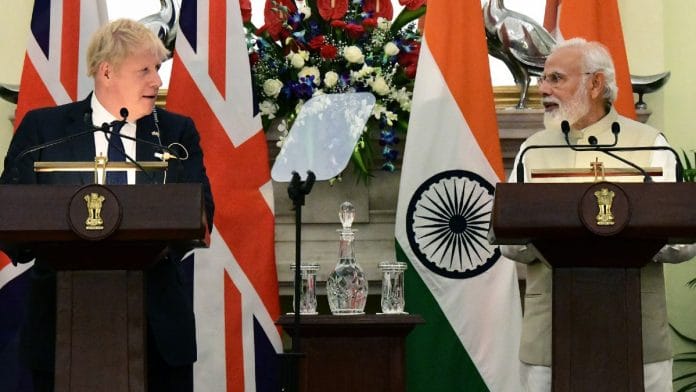New Delhi: British Prime Minister Boris Johnson’s two-day hurricane visit to India came to an end Friday with a packed set of deliverables as he met Prime Minister Narendra Modi for an in-person summit for the first time.
Giving a push to the two countries’ Comprehensive Strategic Partnership, which was announced at their last virtual summit in May 2021, Modi and Johnson decided to expand India-UK defence collaboration during their meeting Friday, including joint production and co-development of fighter jets and next-generation jet engine technology.
The two sides have also instructed their respective officials to conclude the negotiations for a free trade agreement (FTA) by “Diwali”, while tariff issues continue to pose challenges.
“Teams of both countries are working on the subject of the Free Trade Agreement. Good progress is being made in the negotiations. And we have decided to make full efforts towards the conclusion of the FTA by the end of this year,” said Modi.
Modi also said, “We have also agreed to enhance cooperation in the defence sector. We welcome the UK’s support for ‘Atmanirbhar Bharat’ in all sectors of manufacturing, technology, design, and development in the defence sector.”
Referring to India as a “stunning and shining” country, the British PM said the two countries would increasingly collaborate to bolster each other’s domestic defence industries. He announced an “open general export license” to facilitate the transfer of technology, thereby allowing Indian defence firms to participate in the UK’s aviation and naval shipbuilding programmes.
Addressing a press conference before leaving for the UK, Johnson said, “Our new and expanding defence and security partnership will enable India to strengthen its own domestic defence industry as well as protecting vital shared interests in the Indo-Pacific.”
Johnson, however, made it clear that the UK would “make sure” that such collaboration doesn’t result in sensitive defence technology that it transfers to India ending up in Russia.
According to the British PM, India and the UK should constantly focus on “sticking together and confronting our shared anxieties on autocratic coercions around the world, and act together to make our countries safe and more prosperous.”
“India is an incredible rising power in Asia, one of the fastest-growing economies in the world … India is also our biggest partner in the Indo-Pacific, which is increasingly the geopolitical centre of the world,” he added.
He also said that the two countries’ national security advisors (NSA), defence and foreign ministers would be meeting together in a “rolling programme” to kickstart all the projects.
“The two prime ministers looked forward to the convening this year of the Defence Ministerial Dialogue, which would be an important step to ensure that all the necessary framework agreements are in place,” said the India-UK joint statement.
Also Read: UK PM talks ‘powerhouse partnership’ with India, says New Delhi-Moscow relationship ‘different’
Whisky tariffs a ‘tough one’ on proposed India-UK FTA
While the two leaders decided to conclude the negotiations — launched in January 2022 — by October this year, Johnson said India’s imposition of tariffs on imported whisky and other liquors remains a hurdle.
“There are some huge tariffs … Tariffs on whisky is a tough one… It will be great if we can fix that, but you know there are all sorts of things that need to be addressed,” he said.
India imposes a 150 per cent tariff on imported liquor.
However, Johnson believes the FTA has the potential to generate thousands of jobs on both sides.
Lauding investments made by UK companies in India, Modi said, “We also had discussions on the comprehensive reforms going on in India, our infrastructure modernisation plan and the National Infrastructure Pipeline. We welcome the increasing investment in India by UK companies. And, a good example of this we got to see yesterday at Halol in Gujarat.” Johnson inaugurated UK–based manufacturer JCB’s new plant in Halol Thursday.
Khalistan issue cannot be ‘tolerated’
On being asked what the UK government is doing towards India’s concerns on growing threats from Khalistani organisations and other terrorist elements, Johnson said that the UK has a “very strong view” on extremist groups.
“We have a very strong view in the UK. We don’t tolerate extremist groups setting up in the UK with a view to threatening other countries, threatening India, but what we’ve done particularly as a result of this visit is set up an anti-extremism task force to see what more we can do to help India in that aspect,” he said.
Speaking to reporters on this issue, Foreign Secretary Harsh Vardhan Shringla said Prime Minister Modi did raise the Khalistan issue with Johnson and spoke about India’s policy of “zero tolerance” towards such issues.
UK understands India-Russia relationship
On the issue of India not calling out Russia for its invasion of Ukraine, Johnson said the UK understands that New Delhi and Moscow have age-old ties.
But the British PM also lauded the fact that India had condemned the Bucha killings, and said India is seeing what is happening.
“You have to recognise that the Indians have actually come out with strong language by what happened in Bucha … Modi has spoken to Putin several times, really, to ask him what on earth he thinks he is doing,” Johnson said, adding that “Indians want peace and they want Russians out and I totally agree with that.”
Johnson added, “India has a historic relationship with Russia which everybody understands and that goes back decades.”
(Edited by Rohan Manoj)
Also Read: ‘Serious failure in leadership’ — what civil servant’s probe on UK PM’s lockdown parties found






